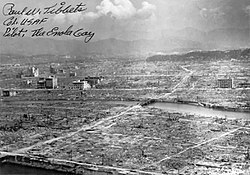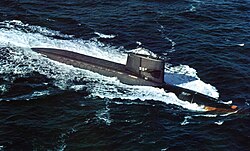Mutual assured destruction
Mutual assured destruction (MAD) is a military strategy in which two opposing military forces are powerful enough to completely destroy each other. It should help to avoid a nuclear war. This usually happens when both forces have nuclear weapons. If a state attacks another with nuclear weapons, the state attacked will potentially be able to attack back. The attacker must think that he will be destroyed with his victim if he attacks. The theory is that no state would start an attack if attacking its enemy means its own destruction.
The concept was first discussed by the futurist, theorist and military strategist Herman Kahn, the founder of the Hudson Institute, who first used the term "mutual assured destruction" in 1962 during the height of the Cold War.[1][2][3] The acronym "MAD", was used by Donald Brennan, a strategist working in Kahn's Hudson Institute, in 1962.[4] Brennan used the acronym cynically, spelling out the English word "mad" to argue that holding weapons capable of destroying society was irrational.[5]
Mutual Assured Destruction Media
Aftermath of the atomic bomb explosion over Hiroshima (August 6, 1945), to date one of the only two times a nuclear strike has been performed as an act of war
The USS George Washington (SSBN-598), the lead ship of the US Navy's first class of Fleet Ballistic Missile Submarines, Nuclear (SSBN)
A time exposure of seven MIRVs from Peacekeeper missile passing through clouds
A payload launch vehicle carrying a prototype exoatmospheric kill vehicle is launched from Meck Island at the Kwajalein Missile Range on December 3, 2001, for an intercept of a ballistic missile target over the central Pacific Ocean.
References
- ↑ Kahn H. 1960. On thermonuclear war. Princeton University Press. ISBN 0-313-20060-2
- ↑ Kahn H. 1962. Thinking about the unthinkable. Horizon Press.
- ↑ Kahn H. 1965. On escalation: metaphors and scenarios. Praeger. Reprint 2010 with new introduction by Thomas C. Schelling, Transaction Publishers. ISBN 978-1-4128-1162-0
- ↑ Daniel., Deudney (1983). Whole earth security : a geopolitics of peace. Washington: Worldwatch Institute. p. 80. ISBN 978-0-916468-54-5. OCLC 9833320.
- ↑ Jervis, Robert (2002). "Mutual Assured Destruction". Foreign Policy (133): 40–42. doi:10.2307/3183553. ISSN 0015-7228. JSTOR 3183553.





